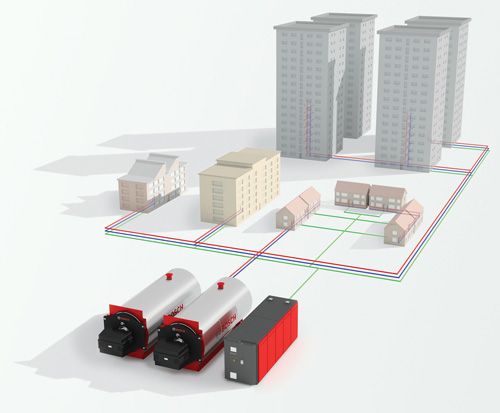

Consultants and contractors responsible for the design of heat networks and district heating schemes are being encouraged to adopt design best practice and avoid unnecessary oversizing.
Pete Mills, commercial technical operations manager at Bosch Commercial and Industrial, is calling for those responsible for the design of heat networks to pay close attention to the sizing of the main heating source and pipework in order to maximise efficiency gains.
Pete said: “Unfortunately, it has become relatively common for heat network schemes in the UK to fall short of industry expectations through oversizing of appliances and pipework. Oversizing a heat network from the outset can have huge ramifications for the long-term efficiency, overall performance, and return on investment of a system. This is before we consider the reputational damage that incorrect design is having on heat networks’ credentials as efficient and cost-effective heating and hot water solutions for multi-residential and commercial buildings.”
According to the Association for Decentralised Energy, there are currently more than 17,000 heat networks in the UK, of which around 91% are located in England and six per cent in Scotland. With the government’s £320 million Heat Networks Investment Project set to provide financial support to up to 200 district heating projects by 2021 and lever in up to £2 billion of wider investment, uptake of this heating approach is showing no signs of slowing.
Pete said: “Many heat network designs we are seeing are not incorporating any renewable energy, waste heat, or low carbon technologies, which should be the foundation of a good scheme that is to provide heat and carbon savings for tenants. We are still lacking a wide base of design experience in the UK and this is something we must start to improve upon. Building developers too, have a role to play in ensuring their developments will deliver good value for their tenants with fair priced heat that starts with a well-designed heat network.
“The UK, particularly its local authorities and housing associations, has the potential to benefit greatly from district heating schemes. It’s therefore paramount that plants and pipework are correctly sized according to heat demand. Smaller pipes, shorter pipework runs and good insulation practices will keep heat losses in a network to a minimum, while benefiting the end-user from the word go.
“Those in doubt should remember that no two heat networks will ever be the same, and that manufacturers will often prove to be an invaluable source of help during the design process.”
